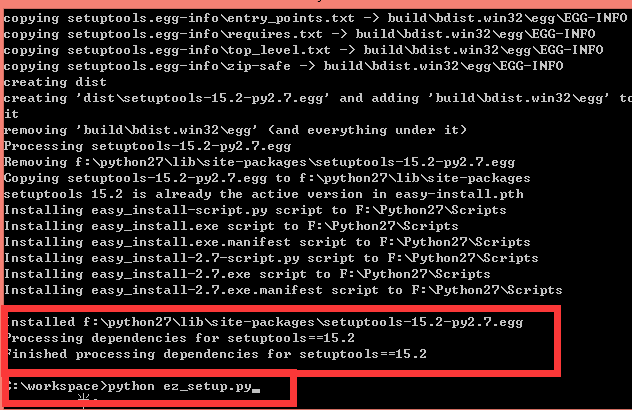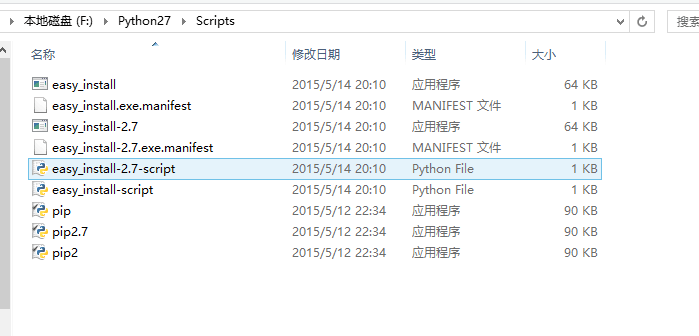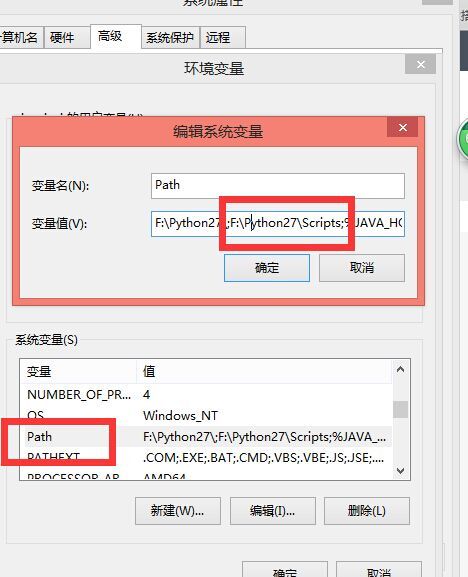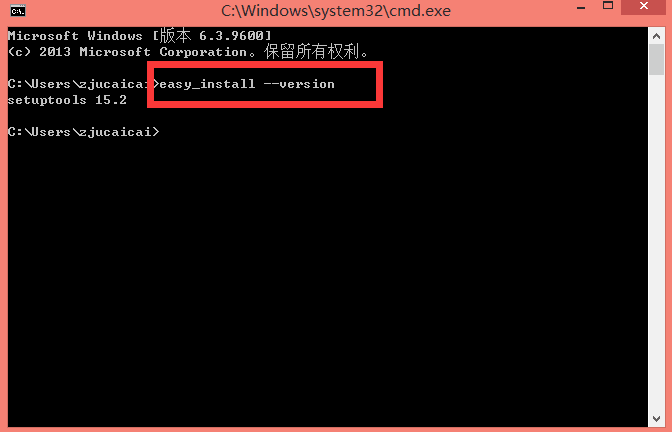win8.1下Python27安装easy_install
下面贴出ez_setup.py的源代码
#!/usr/bin/env python
""" Setuptools bootstrapping installer. Run this script to install or upgrade setuptools. """
import os
import shutil
import sys
import tempfile
import zipfile
import optparse
import subprocess
import platform
import textwrap
import contextlib
import warnings
from distutils import log
try:
from urllib.request import urlopen
except ImportError:
from urllib2 import urlopen
try:
from site import USER_SITE
except ImportError:
USER_SITE = None
DEFAULT_VERSION = "15.2"
DEFAULT_URL = "https://pypi.python.org/packages/source/s/setuptools/"
DEFAULT_SAVE_DIR = os.curdir
def _python_cmd(*args):
""" Execute a command. Return True if the command succeeded. """
args = (sys.executable,) + args
return subprocess.call(args) == 0
def _install(archive_filename, install_args=()):
"""Install Setuptools."""
with archive_context(archive_filename):
# installing
log.warn('Installing Setuptools')
if not _python_cmd('setup.py', 'install', *install_args):
log.warn('Something went wrong during the installation.')
log.warn('See the error message above.')
# exitcode will be 2
return 2
def _build_egg(egg, archive_filename, to_dir):
"""Build Setuptools egg."""
with archive_context(archive_filename):
# building an egg
log.warn('Building a Setuptools egg in %s', to_dir)
_python_cmd('setup.py', '-q', 'bdist_egg', '--dist-dir', to_dir)
# returning the result
log.warn(egg)
if not os.path.exists(egg):
raise IOError('Could not build the egg.')
class ContextualZipFile(zipfile.ZipFile):
"""Supplement ZipFile class to support context manager for Python 2.6."""
def __enter__(self):
return self
def __exit__(self, type, value, traceback):
self.close()
def __new__(cls, *args, **kwargs):
"""Construct a ZipFile or ContextualZipFile as appropriate."""
if hasattr(zipfile.ZipFile, '__exit__'):
return zipfile.ZipFile(*args, **kwargs)
return super(ContextualZipFile, cls).__new__(cls)
@contextlib.contextmanager
def archive_context(filename):
""" Unzip filename to a temporary directory, set to the cwd. The unzipped target is cleaned up after. """
tmpdir = tempfile.mkdtemp()
log.warn('Extracting in %s', tmpdir)
old_wd = os.getcwd()
try:
os.chdir(tmpdir)
with ContextualZipFile(filename) as archive:
archive.extractall()
# going in the directory
subdir = os.path.join(tmpdir, os.listdir(tmpdir)[0])
os.chdir(subdir)
log.warn('Now working in %s', subdir)
yield
finally:
os.chdir(old_wd)
shutil.rmtree(tmpdir)
def _do_download(version, download_base, to_dir, download_delay):
"""Download Setuptools."""
egg = os.path.join(to_dir, 'setuptools-%s-py%d.%d.egg'
% (version, sys.version_info[0], sys.version_info[1]))
if not os.path.exists(egg):
archive = download_setuptools(version, download_base,
to_dir, download_delay)
_build_egg(egg, archive, to_dir)
sys.path.insert(0, egg)
# Remove previously-imported pkg_resources if present (see
# https://bitbucket.org/pypa/setuptools/pull-request/7/ for details).
if 'pkg_resources' in sys.modules:
del sys.modules['pkg_resources']
import setuptools
setuptools.bootstrap_install_from = egg
def use_setuptools( version=DEFAULT_VERSION, download_base=DEFAULT_URL, to_dir=DEFAULT_SAVE_DIR, download_delay=15):
""" Ensure that a setuptools version is installed. Return None. Raise SystemExit if the requested version or later cannot be installed. """
to_dir = os.path.abspath(to_dir)
# prior to importing, capture the module state for
# representative modules.
rep_modules = 'pkg_resources', 'setuptools'
imported = set(sys.modules).intersection(rep_modules)
try:
import pkg_resources
pkg_resources.require("setuptools>=" + version)
# a suitable version is already installed
return
except ImportError:
# pkg_resources not available; setuptools is not installed; download
pass
except pkg_resources.DistributionNotFound:
# no version of setuptools was found; allow download
pass
except pkg_resources.VersionConflict as VC_err:
if imported:
_conflict_bail(VC_err, version)
# otherwise, unload pkg_resources to allow the downloaded version to
# take precedence.
del pkg_resources
_unload_pkg_resources()
return _do_download(version, download_base, to_dir, download_delay)
def _conflict_bail(VC_err, version):
""" Setuptools was imported prior to invocation, so it is unsafe to unload it. Bail out. """
conflict_tmpl = textwrap.dedent(""" The required version of setuptools (>={version}) is not available, and can't be installed while this script is running. Please install a more recent version first, using 'easy_install -U setuptools'. (Currently using {VC_err.args[0]!r}) """)
msg = conflict_tmpl.format(**locals())
sys.stderr.write(msg)
sys.exit(2)
def _unload_pkg_resources():
del_modules = [
name for name in sys.modules
if name.startswith('pkg_resources')
]
for mod_name in del_modules:
del sys.modules[mod_name]
def _clean_check(cmd, target):
""" Run the command to download target. If the command fails, clean up before re-raising the error. """
try:
subprocess.check_call(cmd)
except subprocess.CalledProcessError:
if os.access(target, os.F_OK):
os.unlink(target)
raise
def download_file_powershell(url, target):
""" Download the file at url to target using Powershell. Powershell will validate trust. Raise an exception if the command cannot complete. """
target = os.path.abspath(target)
ps_cmd = (
"[System.Net.WebRequest]::DefaultWebProxy.Credentials = "
"[System.Net.CredentialCache]::DefaultCredentials; "
"(new-object System.Net.WebClient).DownloadFile(%(url)r, %(target)r)"
% vars()
)
cmd = [
'powershell',
'-Command',
ps_cmd,
]
_clean_check(cmd, target)
def has_powershell():
"""Determine if Powershell is available."""
if platform.system() != 'Windows':
return False
cmd = ['powershell', '-Command', 'echo test']
with open(os.path.devnull, 'wb') as devnull:
try:
subprocess.check_call(cmd, stdout=devnull, stderr=devnull)
except Exception:
return False
return True
download_file_powershell.viable = has_powershell
def download_file_curl(url, target):
cmd = ['curl', url, '--silent', '--output', target]
_clean_check(cmd, target)
def has_curl():
cmd = ['curl', '--version']
with open(os.path.devnull, 'wb') as devnull:
try:
subprocess.check_call(cmd, stdout=devnull, stderr=devnull)
except Exception:
return False
return True
download_file_curl.viable = has_curl
def download_file_wget(url, target):
cmd = ['wget', url, '--quiet', '--output-document', target]
_clean_check(cmd, target)
def has_wget():
cmd = ['wget', '--version']
with open(os.path.devnull, 'wb') as devnull:
try:
subprocess.check_call(cmd, stdout=devnull, stderr=devnull)
except Exception:
return False
return True
download_file_wget.viable = has_wget
def download_file_insecure(url, target):
"""Use Python to download the file, without connection authentication."""
src = urlopen(url)
try:
# Read all the data in one block.
data = src.read()
finally:
src.close()
# Write all the data in one block to avoid creating a partial file.
with open(target, "wb") as dst:
dst.write(data)
download_file_insecure.viable = lambda: True
def get_best_downloader():
downloaders = (
download_file_powershell,
download_file_curl,
download_file_wget,
download_file_insecure,
)
viable_downloaders = (dl for dl in downloaders if dl.viable())
return next(viable_downloaders, None)
def download_setuptools( version=DEFAULT_VERSION, download_base=DEFAULT_URL, to_dir=DEFAULT_SAVE_DIR, delay=15, downloader_factory=get_best_downloader):
""" Download setuptools from a specified location and return its filename. `version` should be a valid setuptools version number that is available as an sdist for download under the `download_base` URL (which should end with a '/'). `to_dir` is the directory where the egg will be downloaded. `delay` is the number of seconds to pause before an actual download attempt. ``downloader_factory`` should be a function taking no arguments and returning a function for downloading a URL to a target. """
# making sure we use the absolute path
to_dir = os.path.abspath(to_dir)
zip_name = "setuptools-%s.zip" % version
url = download_base + zip_name
saveto = os.path.join(to_dir, zip_name)
if not os.path.exists(saveto): # Avoid repeated downloads
log.warn("Downloading %s", url)
downloader = downloader_factory()
downloader(url, saveto)
return os.path.realpath(saveto)
def _build_install_args(options):
""" Build the arguments to 'python setup.py install' on the setuptools package. Returns list of command line arguments. """
return ['--user'] if options.user_install else []
def _parse_args():
"""Parse the command line for options."""
parser = optparse.OptionParser()
parser.add_option(
'--user', dest='user_install', action='store_true', default=False,
help='install in user site package (requires Python 2.6 or later)')
parser.add_option(
'--download-base', dest='download_base', metavar="URL",
default=DEFAULT_URL,
help='alternative URL from where to download the setuptools package')
parser.add_option(
'--insecure', dest='downloader_factory', action='store_const',
const=lambda: download_file_insecure, default=get_best_downloader,
help='Use internal, non-validating downloader'
)
parser.add_option(
'--version', help="Specify which version to download",
default=DEFAULT_VERSION,
)
parser.add_option(
'--to-dir',
help="Directory to save (and re-use) package",
default=DEFAULT_SAVE_DIR,
)
options, args = parser.parse_args()
# positional arguments are ignored
return options
def _download_args(options):
"""Return args for download_setuptools function from cmdline args."""
return dict(
version=options.version,
download_base=options.download_base,
downloader_factory=options.downloader_factory,
to_dir=options.to_dir,
)
def main():
"""Install or upgrade setuptools and EasyInstall."""
options = _parse_args()
archive = download_setuptools(**_download_args(options))
return _install(archive, _build_install_args(options))
if __name__ == '__main__':
sys.exit(main())我们新建一个ez_setup.py文件。并把上面的源代码copy到.py文件中。然后进行运行它
在windows cmd窗口 python ez_setup.py进行运行
然后我们Python目录中,发现多了一下这个文件夹

最后增加path路径F:\Python27\Scripts 因为我把Python装在F盘下,所有修改环境变量PATH值的时候在F盘下边, 最后检查我们easy_install版本
最后检查我们easy_install版本
这样我们就安装完成了,接下来我们可以安装Django,等等就十分方便了